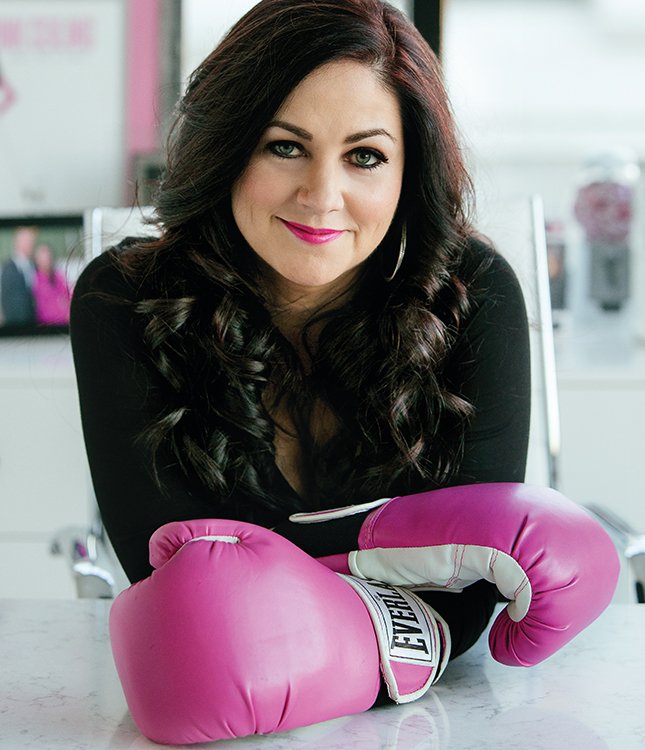“This isn’t charity,” Cindy Whitehead tells Worth about her new venture, her first since 2015, when she sold her prior company, a drugmaker called Sprout, for a billion dollars. “Make no mistake,” Whitehead says. “This is capitalism.”
We’re talking about the Pink Ceiling, a company Whitehead founded in Raleigh, N.C., in April 2016 to “make other women really fucking rich,” as she frequently puts it. It’s a mantra that takes you by surprise with its directness and the expletive, and the impact is diminished only slightly by the fact that she uses it repeatedly.
The Pink Ceiling is a venture capital firm, a consultancy and an incubator—Whitehead calls it the Pinkubator—with a mission: to support companies that aim to improve women’s lives. Many of the companies that the Pink Ceiling works with are run by women, and Whitehead believes that, because of that fact, they do not get the financial support they deserve. “Ideas can be overlooked because of a factor as simple as whether or not the person in charge shows up wearing pink,” she explains. Focusing on businesses run by and for women is merely exploiting a blind spot in the male-dominated investment world. “It is capitalism on the side of right,” Whitehead says.

Whitehead, who has long black hair that frames an engaging smile, does frequently show up in hot pink—pink lipstick, pink nail polish, pink dresses, pink skirts, pink blouses, sometimes paired with black leggings or black pants.
Her trademark style dates to her days as a drug company entrepreneur at Sprout Pharmaceuticals, which she launched in 2011 with her then husband, Bob Whitehead, a longtime drug industry executive. Prior to that, the duo cofounded Slate Pharmaceuticals, which makes men’s reproductive health drugs, and the two still work together on occasion, though they divorced before selling Sprout.
At Sprout, the Whiteheads won FDA approval for Addyi (pronounced add-ee), a drug the company claimed boosted female sexual desire—the media quickly dubbed it “the female Viagra.” Whitehead’s decision to wear pink while marketing a product also known as the “little pink pill” denoted her transition, she says, “from underestimated to unapologetic.” She found the best way for herself. “Do you rail against it, or do you go right for it because it is the conversation we should have? And I guess, if you have my personality, you go right for it…I showed up in rooms where I was unexpected, and being unexpected I was underestimated. I had two choices. I was either going to let that fill me with self-doubt or frustration, or I was going to harness that for the element of surprise. And I was going to surprise them with my confidence.”
“I was going to surprise them with my confidence.”

Whitehead chose the pharmaceutical field while at Marymount University, a Catholic school in Arlington, Va., after spending numerous hours in the library perusing business publications. Her father, Fred Eckert, was a New York state senator and a U.S. congressman. He was also a confidant of Ronald Reagan; the president appointed him ambassador to Fiji and, later, the United Nations Agencies for Food & Agriculture, based in Rome. From the fourth grade through high school, Whitehead moved every year of her life. The constant travel gave her a hunger for stability—she chose college in Northern Virginia so she could stay in the area where she spent her final year of high school. But it also taught her the importance of mobility and keeping an open mind. “I figured out I could learn new things from all different kinds of people,” she later said. “It’s made me good at observation, pretty good at appreciating different points of view and hugely adaptable.”

Inspired by an influential business professor in college, Whitehead set her eyes on a job at Merck postgraduation because of its reputation as one of the best Fortune 500 companies for which to work. Within months of graduation, she had a job there. “When I went there it really was to learn business,” she says. “I wanted to know: Why are you Fortune’s most admired?” Several years later, she followed the advice of her brother, a startup veteran, and took a job at a smaller company, San Diego–based Dura Pharmaceuticals, where she moved into management and met Bob Whitehead, her future husband and business partner.
Cindy Whitehead rose through the ranks. In 2000, the Irish company Elan Pharmaceuticals bought Dura, and Whitehead helped Elan integrate the two companies. “It was an incredible chance to look at every aspect of building the company. Which products were we going to divest? How were we going to construct the team? What was our vision? I was very fortunate to be at that table with all of the senior people involved in that integration,” she says. From there, Whitehead moved into Elan’s corporate communications team to help with a rebrand in the U.S. The experience started Whitehead on the path of finding the best way to sell any product.
Soon after Elan bought Dura, Whitehead cashed in her stock options and became a consultant for McCann Erickson, where she worked on marketing skin care products. It was also during this post-Dura time that she started dating Bob, the former COO of the company. He had stayed on at Elan to manage its commercial operations in the Americas. When Bob left the West Coast for a bioscience startup in Philadelphia, Cindy went too. She began working with QVC, where she helped to get new dermatological products, such as a successful Australian skin care line, distributed to consumers through the shopping channel. Shortly after returning to the East Coast, the two were married.
In 2005, the Whiteheads cofounded a company called Slate, with Bob as CEO and Cindy as COO. The name was meant to be descriptive: This was their “blank slate.”
“We just felt that together we had the skill sets to try and do our own thing,” Bob, soft-spoken, says. “So we took a shot at it. We left Philadelphia, we moved to Raleigh, and we looked for products for a couple of years.” Eventually, the Whiteheads purchased and began marketing a drug called Testopel, an implantable testosterone pellet that was FDA-approved as a treatment for delayed puberty in males. But the way in which Slate marketed Testopel pushed the limits of ethics, according to the FDA. An article in Philadelphia magazine details how, at one point, the Testopel website suggested that the drug could also be used as a treatment for depression, erectile dysfunction, type 2 diabetes and HIV. In March 2010 the FDA sent Bob Whitehead an 11-page letter lambasting the company for its marketing. Slate’s promotional tools and claims, the agency said, “promote unapproved uses of Testopel, omit and minimize important risk information associated with Testopel…overstate the efficacy of Testopel, present unsubstantiated superiority claims for Testopel” and more. “We are extremely concerned by the breadth and scope of violations reflected in your promotional materials,” the letter said.
The Whiteheads have said that Slate promptly discontinued the practices. “At the time we were a tiny company,” Bob says. “We weren’t doing anything different than what the biggest players were doing. We just got picked on. But I think we dealt with it professionally; we were definitely responsive to the corrections that the agency asked us to make.” Because Slate was privately held, it’s difficult to know how well the marketing worked, but the Whiteheads claimed that Testopel became the second-most prescribed testosterone treatment by urologists.
In 2011, the Whiteheads sold Slate in order to buy a drug called flibanserin from German drugmaker Boehringer Ingelheim. “We sold Slate one day, and the very next day we acquired flibanserin and started Sprout,” Bob recalls. The drug company was testing flibanserin as an antidepressant, and in clinical trials some women taking the drug had recorded a small but statistically significant increase in the number of “satisfying sexual events”—that’s the technical term—they had each month. As they had with Testopel, the Whiteheads saw an opportunity to address a sexual concern. To market flibanserin, the Whiteheads started a new company called Sprout; the name was intended to suggest a company that “sprouted” out of Slate. In flibanserin, the Whiteheads saw a potentially enormous opportunity to deal with a problem that, depending on whom you talked to, was either particularly difficult for drugmakers to address or particularly difficult to get clinicians and others to acknowledge. “If a woman goes into a gynecologist today, she is typically asked three questions,” Cindy Whitehead says. “She’s asked, ‘Are you sexually active?’ ‘Do you want birth control?’ and, ‘Do you want to be tested for STDs?’ If we add one question—‘Are you satisfied?’—we’d change the conversation about women and sex forever. It’s that satisfaction component that we still don’t talk about.”
“If we add one question—‘Are you satisfied?’—we’d change the conversation about women and sex forever. It’s that satisfaction component that we still don’t talk about.”

The challenge for Sprout: In 2010, despite a PR campaign from Boehringer Ingelheim, the FDA had denied an application by the company to approve the drug as a treatment for “hypoactive sexual desire disorder”—basically, a loss of sexual desire that can’t be attributed to a physiological cause. (The denial played an important part in the firm’s decision to sell rights to the drug to the Whiteheads.) In 2013 Sprout filed another application for FDA approval, but that too was rejected, because the benefits of the drug were unclear and there were potential adverse health consequences from taking it. Meanwhile, Whitehead found that when she pitched male investors on the drug, they just didn’t get it. “Isn’t jewelry the female Viagra?” she heard more than once. As Whitehead explained in an interview with Fortune, “It did dictate how I raised money. I knew I wasn’t going to get classical funding, so I went out and built an incredible network of high net worth individuals and angels who bet on me early.”
To fight for FDA approval, Sprout hired a PR firm called Blue Engine Media, which in turn launched a high-profile campaign that framed FDA approval of Addyi as a gender issue—or, more precisely, which implied that FDA’s refusal to approve Addyi represented institutional sexism. The campaign, called “Even the Score,” distributed to the press and regulators stories of women who had allegedly had relationships ruined or suffered from depression caused by low libido. According to a subsequent report by the Hastings Center, a bioethics research institute based in Garrison, N.Y., Even the Score repeatedly claimed that there were 26 government-approved treatments for male sexual dysfunction—and none for women. (Whether or not this statistic is true depends on how you define sexual dysfunction drugs.) A parody of a Viagra advertisement funded by Even the Score showed a beautiful woman pretending to make a pitch for Viagra—then pivoting to point out that there was no FDA-approved female equivalent. “Are we really so far behind that we don’t think women have the right to sexual desire? Yet again, we come second.” Lounging on a beach in a caftan, the blonde turns to the camera and says, “Women deserve better. Let’s even the score.”
Even the Score also enlisted the support of the National Organization for Women, the National Consumers League, Black Women’s Health Imperative, Jewish Women International and other women-oriented groups, all of which echoed the idea that the FDA’s refusal to approve Addyi represented “gender bias.” Throughout, critics pointed out that Addyi wasn’t all that effective—users reported an additional one-half of a sexual event per month relative to women taking a placebo—and that, as one journalist put it, “Addyi works more like a roofie than a love potion…causing dizziness, drowsiness, nausea and, when mixed with alcohol, unconsciousness.”
For her part, Whitehead is unapologetic about the campaign to win approval for Addyi. “I think that advocacy is the heart of the discussion around patients and conditions for which we do not have answers,” she says. “I’m a huge believer in who better to answer questions than the patients themselves who are suffering from it.
“The burden on the pharmaceutical company is we need to characterize the benefit and the risk. But once you characterize the benefit and the risk of a drug, nobody gets to make a value judgment on whether or not the patient should get it.” This is particularly true, she says, when it comes to the low-libido issues Addyi was approved to address. “If this conversation were about diabetes, unless I had diabetes I probably would have no particular point of view,” she says. “When it’s sex, I have a point of view.”
Despite the doubts about Addyi’s efficacy, the Even the Score campaign worked; the FDA approved the drug in August 2015, making it the first FDA-approved drug whose purpose was to increase desire for women. Within days the Whiteheads closed a deal to sell Sprout to Canadian drug company Valeant for $1 billion. Bob, who had been Sprout’s executive vice chair, left the company in October, when Valeant took over, but Cindy, the CEO of Sprout, stayed on through December. The Whiteheads had numerous investors in Sprout, so the sale money didn’t all go to them. Still, the deal meant that Cindy Whitehead had secured one of the biggest exits for any woman ever.
Things didn’t work out so well for Valeant, which, shortly after purchasing Sprout, found itself embroiled in an accounting scandal, was investigated by the SEC and ousted CEO Michael Pearson. Its attempts to commercialize Addyi languished, and with sales of the drug alleged to have generated less than $10 million in 2016—according to Fortune, in large part because many insurers denied coverage for the pill—Valeant announced in late 2017 it would return rights to the pill back to Sprout’s investors in exchange for a royalty on sales. Because Cindy and Bob Whitehead are major shareholders, the deal would put the drug’s fate back in their hands—and could potentially mean that Addyi will become part of the Pink Ceiling’s portfolio. Valeant also announced that it would support the sales and marketing of Addyi with a $25 million loan.
“This seems to me that they bought the product on the headline instead of doing the due diligence,” says John Jaeger, who heads the life sciences practice at the pharmaceutical consulting firm DRG. The drug was expensive, he says, and comes with a host of issues. “You spend all this money out of pocket, you’re taking a pretty risky drug, you take it every day, you can’t take it with alcohol and, oh by the way, the response rate is not that great. That is a pretty high cost to a pretty low benefit.”
In the months after Whitehead left Sprout, she thought hard about what to do next. Her experience at Sprout, she explains, was “transformative. At the end of it, it was abundantly clear that my work was going to be, at the heart of it, advocacy. Not only advocacy for myself and what I believed in, but for other women.” The Pink Ceiling will, she says, “find those other women who are disruptive, who will bring these things to market and who have a thoughtfulness about why they’re solving that problem.” Presumably, that problem-solving will also lead to profits.
“I think Cindy’s approach to it is that if she’s going to draw people into this environment,” says Braxton Goodrich, an investor in Slate and Sprout, “she has to make outsized returns. If you do believe that women are not invested in correctly, then the flip side of that hypothesis is you should drive larger-than-scale returns to those investments. So far she’s done that.”
“Find those other women who are disruptive, who will bring these things to market and who have a thoughtfulness about why they’re solving that problem.”
Many of the Pink Ceiling’s initial investments are in healthcare, but not all. What the recipients of Pink Ceiling investments do have in common is that they seek to address women-centric problems. One company, called Lia, is developing a pregnancy test that can be flushed down the toilet. A second, mother-daughter startup called Medolac seeks to deliver shelf-stable human breast milk to hospitals after buying it from nursing women. Medolac, which notes on its website that “we are committed to ethical marketing and promotion of our products,” aspires to keep prices low, according to cofounder Adrianne Weir, to reach as many women in need as possible.
“She really is so much more than just a check,” Weir says of Whitehead. She explains that not all investors would understand that a company would choose to charge less for a medical product than the market might bear. “There’s a perception that if you charge more, then your valuation will be higher.” But Medolac wants to give more infants access to milk so that they can “go home alive and healthy to their families.”
The Pink Ceiling’s all-female team helps the company tell its story. “At Medolac, we’re really, really good at science and really, really bad at storytelling,” Weir says. “The Pink Ceiling is really good at storytelling. When they talk about what we do, we’re like, ‘Oh, you make is sound so easy, and you make it sound so good. Why can’t we explain it that way?’”
The Pink Ceiling has also invested in a small startup called Undercover Colors, which touts a nail polish that changes colors when it detects drugs used to facilitate date rape, such as Rohypnol and GHB; in theory, wearers will simply dip a finger in their drink, and if their nail polish changes color, the drug is detected. Pink Ceiling invested $5.5 million in the North Carolina company, and Whitehead became chairman of its board.
Describing itself as “the first fashion company empowering women to prevent sexual assault,” Undercover Colors won a Voices of Solidarity award from a nonprofit women’s organization called Vital Voices; the award was presented in December 2016 at a lavish New York dinner hosted by talk show host Seth Meyers and actress Allison Williams. Vital Voices has a history of supporting pro-women causes, but the award seemed premature; Undercover Colors first announced its concept in 2014 but doesn’t have a product yet, and skeptics have raised concerns about efficacy and safety—what chemicals might a woman consume after dipping a drug-detecting finger in her drink?
There were signs that Whitehead was putting her prodigious marketing gifts to work. Vital Voices listed the Pink Ceiling as a “vice-chair” of the event, and in early January, the organization issued a press release announcing that Whitehead was joining its board.
Whitehead doesn’t shy away from this conversation about money, power, gender and women’s health. “Money is power in making decisions and change,” she says, from the J.P. Morgan Healthcare Conference (where, the healthcare publication Stat noted, there were more men named Michael giving presentations than there were female CEOs). “Once there is this equality and diversity of thought on the other side of the table, I bet the things that we see invested in and elevated will look a little different.
“Gender stereotypes leave you two options,” Whitehead adds. “You can run away from those things that are classically female because they will be counted against you. Or you can run right toward them, reframing perceptions by embracing your femininity as a strength.”











